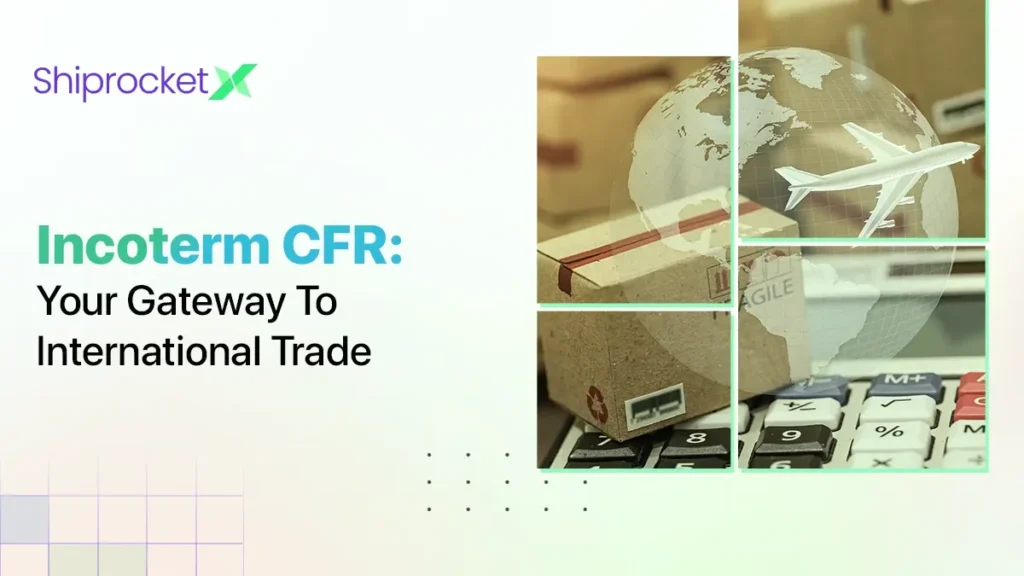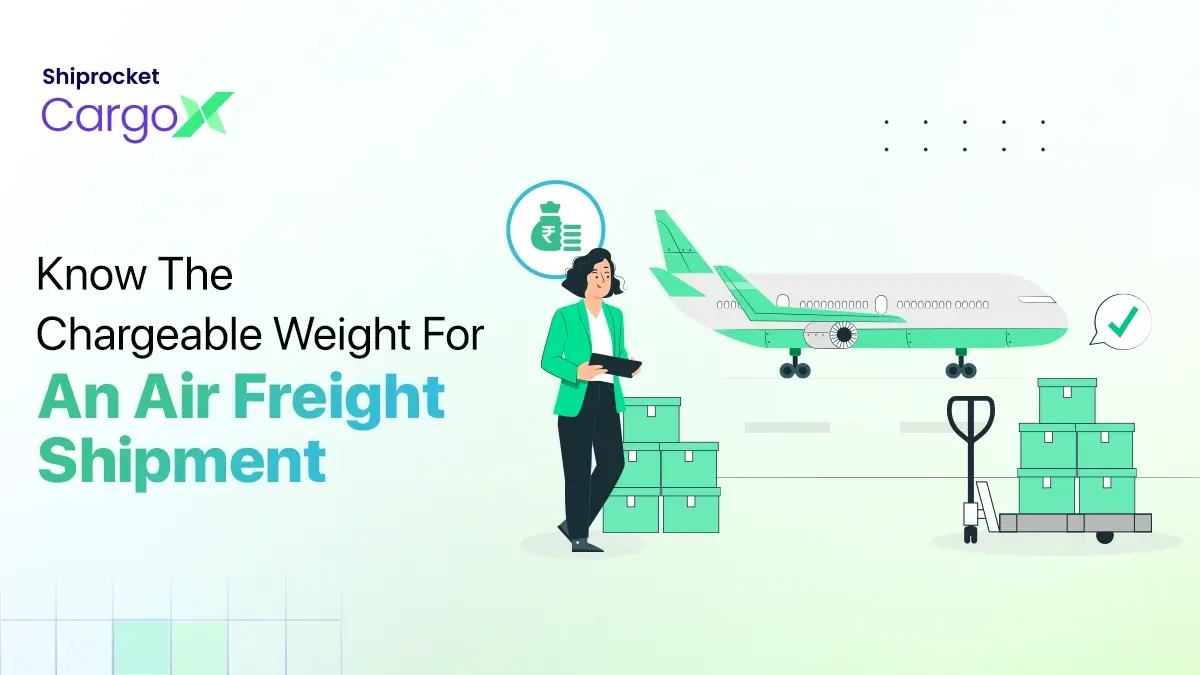Incoterm CFR: Roles, Benefits and Drawbacks
In the world of logistics, the words cost and freight go hand-in-hand. These terms can become tricky when considering it globally. The International Chamber of Commerce developed several Incoterms to end all these confusions. They are communication rules that enable merchants, traders, and shippers to navigate the international shipping processes. Amongst the various Incoterms, the ones that refer to the Cost and Freight (CFR) are extremely important as they answer questions regarding payment and responsibility.
Throughout this article, we will discuss everything relevant to CFR, the responsibilities of the buyer and seller, and more.

A General Idea of CFR Incoterm
Cost and Freight represent a set of responsibilities and obligations that form the core of any international trade contract. It is extremely integral to the seller. The CFR incoterm is specially customized for freight traded via the ocean or air. Under this Incoterm, the seller must prepare the vessel, containing the goods to be shipped, that will travel to the designated location. The seller’s responsibility includes bearing all costs until the goods are safely loaded into the shipping container.
CFR is the section that caters specifically to bulk transportation of cargo, that cannot be put into a container. It distinctly stands out from the other defined Incoterms like CPT. Terms like CPT are used for containerized cargo or cargo shipped through multiple modes of transportation. Understanding the different nuances of CFR can help eCommerce businesses ensure successful order fulfillment.
Sellers’ Responsibilities Outlined in CFR
CFR outlines the responsibilities of the buyer and the seller clearly. This distinction enables easy international shipping and allows to simplify the trade contracts. The seller’s responsibilities include:
- Transporting the purchased goods to the port specified by the buyer: The seller is responsible for ensuring that the goods purchased by the buyer reach the port selected by the buyer within the agreed-upon time. CFR clearly states that the seller must coordinate with the shipping lines to ensure a hassle-free delivery. The seller must handle all the maritime logistics details, including liaising with shipping companies, selecting the right vessel, and ensuring a safe journey from the warehouse to the designated port.
- Payment for the delivery service to the destination port: The entire financial burden of shipping the goods to the consumer-selected port rests upon the shoulder of the seller as per CFR. It includes all the sea freight operational costs ensuring that the journey across the water bodies does not add any unexpected costs to the buyer’s ledger. A strategic negotiation should occur while managing the freight expenses and contracts. It demands a focused insight into the dynamics of transportation costs.
- Clearance for exporting the goods: The number of hurdles encountered in the overseas shipping processes is quite large. The seller is also responsible for completing the customs formalities and retrieving the export-import code after completing all the necessary formalities. The documentation in all steps must be meticulously made to avoid complications while gaining clearance. This step is important to avoid delays and unnecessary challenges due to compliance issues.
- Charges for unloading the shipment at the destination port: the CFR is extremely finessed as it details the handling and unloading expenses. The seller must know that he is responsible for controlling and managing the unloading costs while explicitly ensuring these costs are factored into the trade agreement. Contractual specification is vital to avoid unnecessary misunderstandings between the buyer and seller.
- Export marking and packing: The marking and packing needs also fall under the responsibilities of the seller. The CFR is rather clear that the seller must ensure that the goods are well-packed as per the standards along with proper labeling.
- Management of the vessel from the pre-carriage to the terminal range: The transportation from the warehouse to the departure port is called pre-carriage. This segment also falls under the jurisdiction of the seller. All the management and logistics costs are the seller’s responsibility.
- Inspection before shipping: CFR also strongly highlights the quality assurance checks that the seller must conduct. This step ensures that the seller meets both the buyer’s and the regulatory standards of shipping goods internationally.
Buyers’ Responsibilities in CFR
CFR details the following as the buyer’s responsibilities:
- Payment for the purchased goods: The financial burden is strictly on the buyer’s hands as per CFR. The buyer must confirm that the payment for the goods bought complies with the terms and conditions mentioned in the sales contract. The buyer will be responsible for arranging the finances to cover the costs incurred for purchasing the products and shipping them to the designated port.
- Transportation to the end location: After the shipment reaches the designated port, further transportation responsibilities fall into the buyer’s hands. From that point on, the buyer is responsible for arranging the transit of the purchased goods to the final shipping point. Engagement with the local carriers and regional logistics agents is necessary to ensure this process happens seamlessly.
- Clearances for importing along with the mandated duties: All the import duties levied are the buyer’s burden. The buyer must handle all the extensive procedures and documents needed to legally import goods to a country as per CFR. Proper communication with the right authorities with a complete understanding of the import processes is needed to get these clearances.
- Customs handling and payments at the destination: The buyer must also be a savant in dealing and handling all the customs paperwork and paying the customs charges at the destination. It needs a thorough understanding of all the regulations of the destination country. Strategic cost management is needed to handle the financial burden. It is also important to make sure that the fees are factored into the final financial planning of the import process.
- Duties and taxes: The responsibility of paying the needed duties and taxes in the destination country falls under the buyer’s jurisdiction as per CFR. The buyer must meet all the tax obligations and regulations to avoid last mine financial repercussions and legal action.
How eCommerce Businesses Benefit From CFR?
CFR simplifies the hurdles and challenges by distinctly demarcating all the responsibilities and obligations of the seller and the buyer. It also highlights the different procedures and processes that must be completed during international shipping, making it easier for online businesses. Here are the merits of CFR for e-commerce businesses:
- CFR provides both buyers and sellers with clarity regarding the cost allocation. It is advantageous for businesses with tight budgets to formulate their finances effectively. As per CFR, the seller must manage the transportation costs until the destination port.
- CFR reduces the shocks and surprises by minimizing the risk of hidden shipping charges and unexpected fees during transport.
- CFR sets forth a clear distinction of the responsibilities between the purchaser and the seller. This clarity is essential for eCommerce businesses.
- As the shipping complications are offloaded to the seller, eCommerce businesses can focus solely on their work processes and product development.
- CFR does not mandate the seller to give the consumer insurance, it allows the buyer the flexibility to arrange for insurance to fit their needs.
- The risk is subjected to the buyer only, upon loading the goods onto a vessel, as per CFR. The risk transfer is defined precisely enabling greater control for both parties in international shipping.
Drawbacks of CFR
CFR also has drawbacks due to its stringent definitions. These include:
- The transfer of risk poses a complication for online businesses. As per the regulations stated by CFR, the risk is transferred to the buyer the minute the goods are loaded onto the vessel in the shipment port.
- Despite CFR providing the buyers flexibility on the insurance aspect, it still places a burden on them to secure comprehensive coverage.
- CFR hinders eCommerce businesses that sell in competitive markets as added expenses can affect pricing strategies.
- Although the seller is responsible for the transportation costs incurred during shipping up to the destination port, the buyer becomes responsible for the major chunk of the remaining costs like import duty, unloading, final transportation, taxes, etc.
When Should Businesses Employ CFR?
In today’s online shopping realm, deploying CFR over the other Incoterms can significantly affect the business. CFR wins in scenarios where bulk and non-containerized cargo is being shipped. It can include raw materials, large equipment, automobiles, etc., not shipped in standard vessels.
Furthermore, enterprises that deal with goods that can be loaded on the ships directly and are stored in a container, find this Incoterm beneficial. This form of unloading directly reduces handling costs and risk of damage. Thus, CFR fits to cargo-type goods perfectly.
Conclusion
CFR is a blend of bitter and sweet. It gives you a fine combination of risk distribution, cost management, and logistics responsibility with immense clarity. It is especially useful for non-containerized cargo when shipped across seas. It is a strategic tool that offers businesses an edge when it is astutely deployed and understood. It might not be the best fit for online businesses however raw materials and bulk cargo find CFR beneficial.
International Commercial Term or ‘Incoterm’ in short is a set of 11 terms defined by the ICC (International Chamber of Commerce) in 1936. These terms prevent confusion by standardizing the responsibilities of buyers and sellers involved in the international sale of goods.
Though both CFR and CIF are quite similar, the one main difference is insurance. CIF (cost insurance freight) requires the seller to buy marine insurance for the cargo. However, the CFR doesn’t require the seller to purchase insurance for the cargo until it reaches the destination port.
Incoterms CFR and FOB differ on accounts of who takes responsibility for the goods and when. FOB implies that the buyer is responsible for the goods once they are loaded on a shipping vessel. Under CFR, the buyer isn’t responsible for the goods until they reach the destination port. Till then, the goods are the seller’s responsibility who incurs all costs to ship the products to the destination port.
There are three other types of Incoterms closely related to CFR for goods transported internationally. These three Incoterms are free alongside ship (FAS), free on board (FOB), and cost insurance and freight (CIF).




